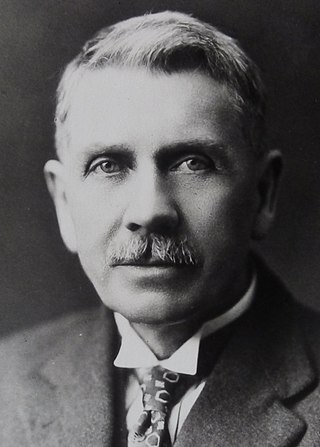
George William Forbes was a New Zealand politician who served as the 22nd prime minister of New Zealand from 28 May 1930 to 6 December 1935.

Sir William Hall-Jones was the 16th prime minister of New Zealand from June 1906 until August 1906.

The 1902 New Zealand general election was held on Tuesday, 25 November, in the general electorates, and on Monday, 22 December in the Māori electorates to elect a total of 80 MPs to the 15th session of the New Zealand Parliament. A total number of 415,789 (76.7%) voters turned out to vote.

William Andrew Veitch was a New Zealand politician. He began his career in the labour movement, but became a strong opponent of more militant socialism, and rejected the radical views held by many of his colleagues.

Sir Thomas Mason Wilford was a New Zealand politician. He held the seats of Wellington Suburbs then Hutt continuously for thirty years, from 1899 to 1929. Wilford was leader of the New Zealand Liberal Party, and Leader of the Opposition from 1920 to 1925.

William Donald Stuart MacDonald was a New Zealand politician, Cabinet Minister, and briefly Leader of the Opposition.

Ronald Morrison Barclay was a New Zealand politician of the Labour Party.

Sir Walter Charles Frederick Carncross was a New Zealand politician of the Liberal Party.

Robert Masters was a New Zealand politician of the Liberal and later United parties, as well as a cabinet minister.

George Laurenson was a New Zealand Member of Parliament for Lyttelton in the South Island.

Frederick Robert Flatman was a New Zealand Member of Parliament of the Liberal Party for the Pareora and Geraldine electorates.

Sir Ethelbert Alfred Ransom was a New Zealand politician of the Liberal Party, then its successor the United Party, and from 1936, the National Party. He was a cabinet minister from 1928 to 1935 in the United Government, and was acting Prime Minister in 1930 and in 1935.

Sir Walter James Broadfoot was a New Zealand politician of the United Party, and from 1936, the National Party. He was a cabinet minister from 1949 to 1954 in the First National Government.
Hurunui was a parliamentary electorate in the Canterbury region of New Zealand, from 1902 to 1963.

Alfred James (Fred) Murdoch was a New Zealand politician, first as an Independent Liberal then of the United Party, and from 1943 the National Party. He was Minister of Agriculture and Minister of Mines from 1930 to 1931 in the United Government of New Zealand.

John O'Meara was a Liberal Party Member of Parliament in New Zealand.

John Stevens was a Liberal Party Member of Parliament in New Zealand.

The New Zealand Labour Party's senior whip administers the "whipping in" system that tries to ensure that party MPs attend and vote according to the party leadership's wishes. The position is elected by the Labour caucus members. The senior whip also acts as an intermediary between the backbenchers and the party leadership. Whenever Labour is in government the senior whip serves as the chief government whip and when out of government serves as chief opposition whip. Thus the position is also referred to as "chief whip".

The New Zealand National Party's Senior Whip administers the "whipping in" system that tries to ensure that party MPs attend and vote according to the party leadership's wishes. The position is elected by the National caucus members. The Senior Whip also acts as an intermediary between the backbenchers and the party leadership. Whenever National is in government the senior whip serves as the Chief Government Whip and when out of government serves as Chief Opposition Whip.

An election for the leadership of the New Zealand Liberal Party was held on 13 August 1925 to choose the next leader of the party. The election was won by Hurunui MP and former senior whip George Forbes.

































